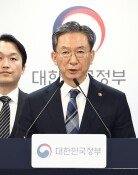[Editorial] Is the government in bargain with Hyundai Construction?
[Editorial] Is the government in bargain with Hyundai Construction?
Posted November. 06, 2000 20:33,
Due to its cash crunches, Hyundai Engineering and Construction (HEC) is barely staying in business since its first failure to honor its checks on Oct. 30. The company's strategy to escape from the crisis still appears deeply in the dark. Hyundai chairman Chung Mong-Hun openly stated that he will sell all the stocks and shares of Hyundai affiliate firms he owns, but that alone will fall far short of meeting the short-term debts and liabilities the company has to redeem in the coming two months.
Our sympathy is on its rescue effort to launch a campaign to sell the Seosan reclaimed land to Hyundai's former executive employees, but the company knows this is far from being a realistic measure to meet the crisis. At this point, then, one wonders what Hyundai's real intentions are, or what it is really up to.
What's more scornful here is the way the government is handling the Hyundai case. Initially, the administration maintained its firm stand to have the company go through a due legal process like a court receivership if it fails to come out with a satisfactory rescue plan. Over the weekend, however, the government's position has become flexible for some unknown reason, and has mentioned such rescue policies as the method of the firm's capital reductions or the firm's letter of agreement for a changeover of loans into its capital.
Now, the administration is going one step further to change altogether its Hyundai policies: it is aiming to resolve the Hyundai Construction crisis by the private financing of all the Chung families. If this was the administration's initial position, it must have shown step by step such an approach from the start. But, if it is a reflection of the administration's shifty stand as the time elapsed, the shifty and vacillating stand must face the public's harsh criticism.
Besides, the administration's interpretations about the Chung families' private funding to rescue the HEC are also inconsistent.
The Fair Trade Commission (FTC) states that purchase of the construction firm's bonds by Hyundai's ex-affiliate companies at a proper price and interest rate has no legal flaws. But, this is rebuked by the Financial Supervisory Commission which maintains that any funding for the ailing firm must be strictly by the private financing of the Chung families, but not by it ex-affiliates.
The FTC's stand could create a troublesome and confusing situation. Because, the small shareholders and foreign investors of HEC could take legal action if and when the ex-affiliates' purchase of the construction firm's bonds results in a big loss.
The real problem here is none other than the administration's loose and lax stand. If the administration's original position was to resolve the Hyundai case according to the rules of the market even if this involved the firm's `court receivership,' it should have stuck to such a stand. But, it appears that the administration was involved in a bargaining deal with the ailing firm in order to find grounds to justify its altered stand.
The principle should be honored that any business firms will be liquidated from the market if they lose viability in market competition and thus contribute to the financial institution's defaults, unless they could show some special future potential to stay in the market. In this regard, it should be pointed out that the HEC's vague North Korean projects, which lack any specific and concrete contents, cannot guarantee the firm of its future potential.
To be sure, this is not a naive advise from someone who does not know some inevitable confusions and difficulties come from enforcing principles. The structural reforms are bound to incur some inevitable sacrifices in one way or another. Despite such painful sacrifices, we must undertake the structural reform because it is the only alternative to keep the nation's economy viable.
If we leave a bad precedent trying to keep alive an impossibly ailing firm, fallout in the market will be an incalculable loss. For that reason, we urge chairman Chung's wise judgment and the administration's courage in resolving the Hyundai Construction case.







